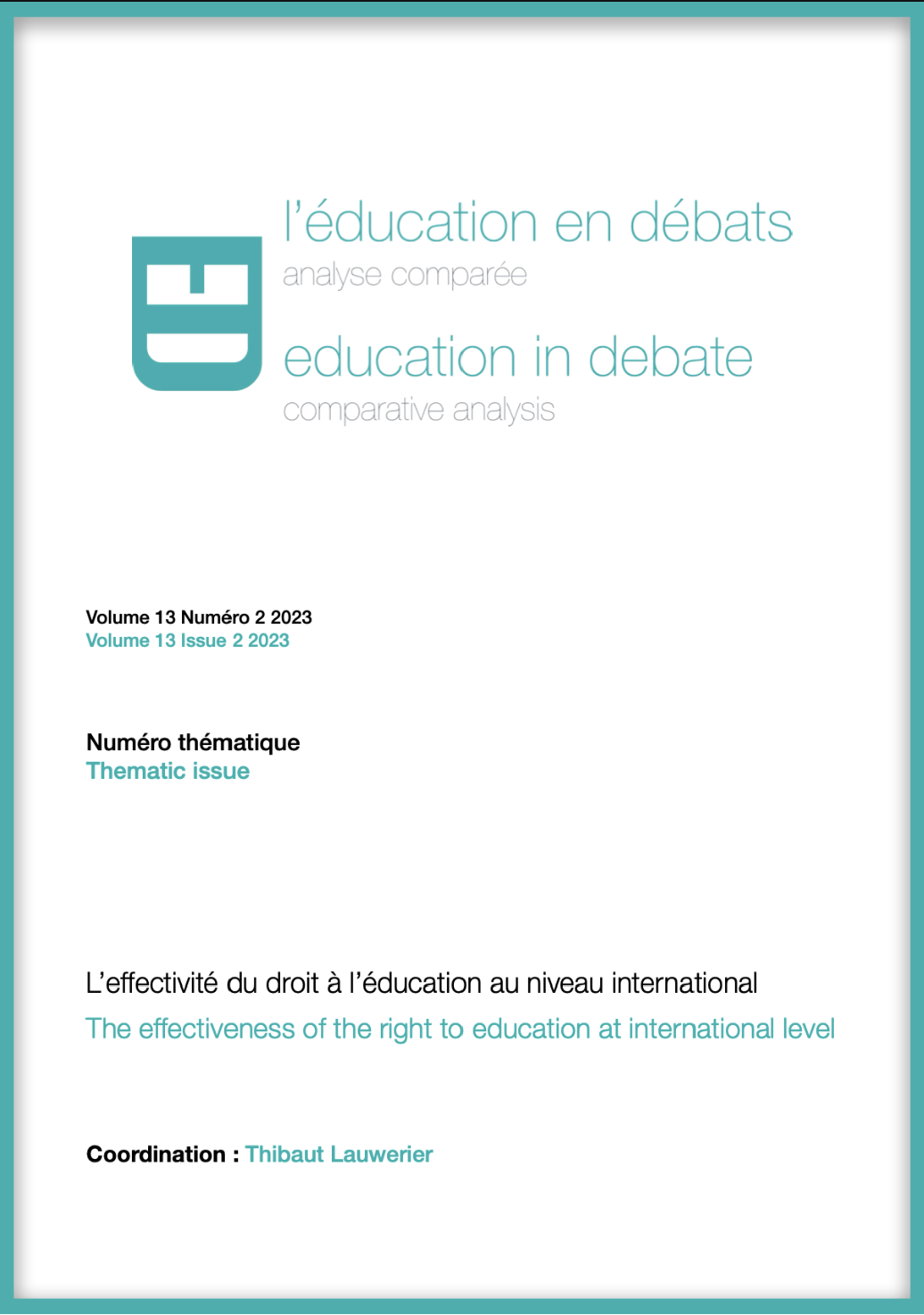Systèmes éducatifs africains. Effets des TICs sur les politiques d’enseignement
DOI:
https://doi.org/10.51186/journals/ed.2023.13-2.e1392Keywords:
digital culture, educational system, human person, integrative knowledge, noumenonAbstract
Faced already with the recognition and modernization of its diverse and multifaceted educational system, the invasion of information and communication technologies (ICTs) in all areas further exacerbates the gap between African countries in their various positions and the rest of the world. Technological progress, a universal heritage, is then examined as an alternative voice/path to the ‟all’’ or ‟nothing’’ policy in terms of knowledge transmission for the purpose of completeness. Indeed, information and communication technologies now convey knowledge to individuals without any other concern for privilege or discrimination, offering themselves as both a path and a voice, exposing humans to their representations as signs. In a semiotic-interactional and philosophical approach, signs are analyzed to describe ICTs as a voice in order to highlight the path they represent for educational systems. It is a discursive space mutating at all levels of the educational system, imposing new paradigms of content to the agent through the interactive framework and the concepts revolving around the right to education.
References
Alphonse, J. (2010). Science métaphysique et codomaines. Pour une métascience. Paris : Bibliothèque Nationale de France.
Avanzini, G. (1995). L’éducation nouvelle et ses concepts. In G. Hameline, J. Helmchen, & J. Oelkers, L’éducation nouvelle et les enjeux de son histoire (pp. 65-74). Berne : Peter Lang.
Barnier, G. (2001). Le tutorat dans l’enseignement et la formation. Paris : L’Harmattan.
Beer, D. (2013). Popular culture and new media. New York, NY: Palgrave Macmillan.
Boyd, D. M., & Ellison, N. (2007). Social network sites: definition, history and scholarship. Journal of Computer-Mediated Communication, 13(1).
Caune, J. (2014). Le corps, objet de discours, moyen de relation. Hermès, la Revue, 1(68), 53-58.
Claparède, E. (1931). L’éducation fonctionnelle. Neuchâtel : Delachaux et Niestlé.
Coutant, A., & Stenger, T. (2009). Processus identitaire et ordre de l’interaction sur les réseaux socionumériques. Les enjeux de l’information et de la communication, 1, 45-64.
David, S., & Marcotte, S. (2015), Le complot médiatique : réseaux sociaux et manipulations collectives chez Jean-Jacques Pelletier. Études littéraires, 46(3), 121-134.
Ferrière, A. (1920). Transformons l’école. Paris : J. Oliven.
Gaillard, J., & Waast, R. (1988). La recherche scientifique en Afrique. La documentation Française, 148, 3-30.
Greene, M. (1995). Releasing the imagination. San Francisco, C.A: Jossey-Bass.
Hameline, D. (2002). Les premières années de Pour l’Ère nouvelle : militantisme et propagande ? Les Sciences de l’éducation. Pour l’Ère nouvelle, 35, 27-40.
Hobbs, R. (2020). Propaganda in an Age of Algorithmic Personalization: Expanding Literacy Research and Practice. Reading Research Quaterly, 0(0), 1-13.
Kant, E. (1787). Critique de la raison pure. Paris : Hatier.
Kitchin, R. (2017). Thinking critically about and researching algorithms. Information, Communication & Society, 20(1), 14-29.
Lokonon, C. (2019). Culture de masse politique lors de l’élection législative de 2019 au Bénin : WhatsApp et la transformation du cadre participatif. Kanian Téré, 3, 182-198
Lokonon, C. (2022). Discours politiques de vœux en contexte Covid 19 : la question des faces de l’instance locutrice ». Cinétismes. Varia, 1(1), 113-125.
Lokonon, C. (2023). Hyperlien : un corps sémiopragmatique dans la presse béninoise. Akofena, 2(7), 269-286.
Marwick, A., & Boyd, D. (2010). I tweet honestly, I teweet passionately: twitter users, context collapse, and the imagined audience. New Media & Society, 13, 114-133.
McLuhan, M. (1964). Understanding Media. The extensions of Man. Cambridge, MA: MIT Press.
Misse, M. (2014). Les théories critiques en communication pour le changement social : regard critique. Revue française des sciences de l’information et de la communication, 4
Paveau, M.-A. (2017). L’analyse du discours numérique. Dictionnaire des formes et des pratiques. Paris : Hermann.
Prilukova, E., Evsina, E., Kwiatkowski, G., & Nestertsova, S. (2019). An insight into a digital human as a thinking human being. SHS Web of Conferences 72 APPSCONF.
Saemmer, A. (2014). Rhétorique du texte numérique : figures de la lecture, anticipations de pratiques. Villeurbanne : Presse de l’Enssib.
Waitherero, N. (2019). A metaphysical understanding of human person and the philosophy of utuism. European Journal of Philosophy, Culture and Religion, 3(1), 1-14.
Downloads
Published
How to Cite
Issue
Section
License
Some rights reserved 2023 The Author(s)

This work is licensed under a Creative Commons Attribution 4.0 International License.




